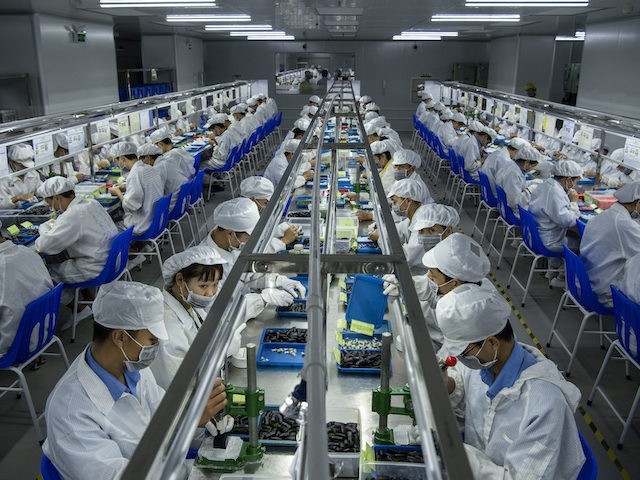An organ of the Chinese Communist Party (CCP) on Friday recommended punishing companies using the “996” labor policy commonly associated with billionaire Jack Ma, who fell out of favor with the CCP last fall.
996 means working from 9:00 a.m. to 9:00 p.m., six days a week for a total of 72 hours of work a week.
Ma is not credited with inventing the 996 system, and his Alibaba corporation was not the only Chinese firm with a 996 work culture, but he became strongly associated with it after outspokenly defending the practice in 2019.
“If we find things we like, 996 is not a problem,” Ma contended in a notorious April 2019 post on Weibo, the Chinese alternative to Twitter, which is banned in the country. According to Ma, long hours should not be an outrageous burden for people who like their jobs, while for those who do not, “every minute is torture.”
“I personally think that 996 is a huge blessing. How do you achieve the success you want without paying extra effort and time?” he said to Alibaba employees in another Weibo post, suggesting every prospective employee of his company should be prepared to work 12-hour days.
Other Chinese tech billionaires defended 996 work schedules, sometimes in even blunter terms than Ma — rival tech mogul Richard Liu reportedly dismissed employees reluctant to work long hours as “slackers” — and there are American observers who suggested U.S. companies should embrace the 996 philosophy if they expected to catch up with China’s surging high-tech industry.
Chinese employees, on the other hand, grew steadily more disenchanted with 996 culture and bitter at Ma and his peers for promoting it.
“Ten years ago, people rarely complained about 996. This industry was booming once, but it’s more of a normal industry now. There are no more giant financial returns. Expecting people to work a 996 schedule on their own like before isn’t realistic,” one veteran of the grind told the New York Times after Ma touted those long hours as a blessing. Ma himself backpedaled and said he merely wanted to praise the dedicated employees who chose to work 72 hours a week, not make it the norm for every worker.
The CCP and its media began fretting that heavy work schedules are unhealthy and cause job burnout. On Thursday, a political advisory body called the Chinese People’s Political Consultative Conference (CPPCC) recommended punishing companies that demand 996 hours or the similar “big/small” schedules, which call for six days of work on alternate weeks. The CPPCC pointed out that Chinese labor laws specify eight-hour days and 44-hour weeks maximum as standard work schedules.
China’s state-run Global Times quoted labor lawyer Zhao Zhanling suggesting workers could meet employers halfway by getting a bit more productive with the hours they work:
Further, it can be hard to define “overtime” especially for firms that don’t require people to punch a time clock. For example, sometimes it’s hard to judge whether the overtime is due to employees’ inefficiency or excessive workloads, according to Zhao.
To solve the long-standing overtime issue, which takes time, three parties must make an effort: self-discipline for employers, enhanced supervision by regulators, and the increase of legal awareness among employees, Zhao noted.
“For companies that intentionally increase working hours to lower labor costs, self-discipline won’t be enough. It requires regulators’ strong law enforcement,” Zhang said, adding “to increase employees’ legal awareness is also an important way.”
On the same day, another state media outlet called China Daily asserted there is “no reason” for any company to demand 996 work schedules or to keep employees constantly on call for remote work on short notice.
“It is time law enforcers stepped in and expanded labor monitoring operations, while the judiciary increased the amount of fines imposed on enterprises for illegally asking their staff members to work extra hours. This way fewer enterprises would dare violate the law. A hardworking spirit is important, but extra hours is not quite the same thing,” China Daily editorialized.
The South China Morning Post’s “Inkstone” news digest expressed skepticism on Friday that 996 culture can be eliminated, even by the heavy hand of CCP regulators, unless labor unions are empowered to make sure Chinese workers are paid enough to make grueling hours unnecessary. Otherwise, the workers will probably respond to the abolition of heavy work schedules by taking second jobs to supplement their reduced income.
According to Inkstone, 996 became a hot topic of debate once more in 2021 after two employees of the major e-commerce platform Pinduodou died allegedly from “work-related stress” and a third created a 15-minute social media video criticizing “overwork culture” at the company. Regulations to control heavy work schedules became one of the hottest topics on Weibo last week.
“When we are young, we trade our health for money. When older, we trade money for health. What are we doing all this for?” one Weibo user asked.

COMMENTS
Please let us know if you're having issues with commenting.